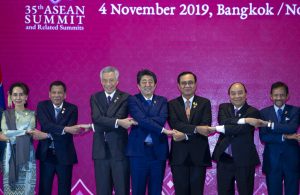In recent days, expressions of horror and condolence have streamed in from around the world following the shock assassination of former Japanese Prime Minister Abe Shinzo on July 8.
Among the most resonant elegies to the former leader have been those issuing from the capitals of Southeast Asia. Under Abe, especially during his second stint in office from 2012 to 2020, Japan significantly bolstered its engagement with the region, and went further than any other democratic nation in offering Southeast Asian nations a like-for-like alternative to China’s infrastructure-led economic engagement.
In many ways, the 67-year-old leader came to embody Japan’s status as the “stealth superpower” in Southeast Asia, as the Philippine foreign policy commentator Richard Heydarian once described it to me: a nation that was large enough to be helpful, but without inciting much in the way of fear and anxiety.
Abe’s legacy will be remembered in the personal relationships that he established during his frequent visits to Southeast Asian capitals, and the vital infrastructure that Japan has funded across the region. The relative longevity of his tenure, and his focus on thickening the economic, political, and security ties with Southeast Asia, including with its smallest nations, is reflected in the breadth of the support that he enjoyed from across the region’s political spectrums.
Singaporean Prime Minister Lee Hsien Loong said on Twitter that he “received with a heavy heart” the news of Abe’s passing, describing the incident as “deeply shocking and distressing,” and describing the former prime minister as a “good friend of Singapore.” He added, “I offer my sincere condolences to Mrs Abe Akie, Mr Abe’s loved ones, and the people of Japan.” Shortly afterward, Singaporean authorities arrested a 45-year-old man for posting a threat against Lee on a Facebook comment thread of an article about Abe’s assassination.
From Indonesia, President Joko Widodo extended his country’s “deepest condolences on the tragic demise of former PM Abe Shinzo. He added, “We will always remember his contributions to strengthening [Indonesia]-Japan cooperation.”
In the Philippines, both the newly inaugurated president, Ferdinand Marcos Jr., and his predecessor Rodrigo Duterte, were effusive in their praise for the Japanese leader. Marcos, who was sworn into office on June 30, expressed his “shock and deep sadness” for the passing of a leader that he said had “many friends and admirers” in the Philippines. “Mr. Abe was a visionary leader who saw Japan through its most difficult times. He was a devoted friend and a supporter of the Philippines, and it was during his leadership that the Philippine-Japan relations truly flourished,” Marcos Jr. said.
Duterte, who hosted Abe at his home in Davao City, Mindanao, during his visit to the Philippines in January 2017, mourned Abe as a “a good and loyal friend, a staunch supporter of my administration and a strong ally of the nation.” Perhaps uniquely, Abe also maintained warm relations with the administration of the late President Benigno Aquino III (2010-2016).
Malaysian Foreign Minister Saifuddin Abdullah said on Twitter that he was “saddened and shocked” by Abe’s assassination, and hailed his “key role in advancing and diversifying further bilateral relations with Malaysia.” Abe visited Malaysia three times as prime minister.
Abe also earned particularly heartfelt elegies from the nations of mainland Southeast Asia, where he broadened and deepened Japan’s already strong commercial and diplomatic presence, pouring billions of yen into the Mekong region, to build vital infrastructure and provide a high quality alternative to China’s Belt and Road Initiative.
In Cambodia, the Ministry of Tourism ordered karaoke, entertainment clubs, bars, discos, and beer gardens to close on Sunday in order to mourn Abe’s passing, while its Ministry of Foreign Affairs denounced his “barbaric assassination.” Prime Minister Hun Sen, whose government continued to maintain close relations with Abe and his successors even as his relations with the West have frayed, said in a statement that he was “extremely shocked and deeply saddened” to learn of Abe’s death, calling him a “longtime good friend of mine and Cambodia.” Hun Sen also instructed all public and private institutions across the country to fly the flag at half-mast on Sunday.
From Vietnam, which Abe visited four times as prime minister, including his first overseas visit after returning to office in 2012, Prime Minister Pham Minh Chinh conveyed his deep sympathies to the Japanese government and people, as well as the family of the former Japanese leader, remarking on the nation’s appreciation “for the special affection and precious support” that Abe had for Vietnam.
Meanwhile, Lao Prime Minister Phankham Viphavanh described Abe as “an important leader” who had made “a significant contribution to guiding and leading Japan… as well as making significant contributions to promoting and deepening the long-standing relations and cooperation between Japan and Laos.”
Thai Prime Minister Prayut Chan-o-cha, through a government spokesman, expressed grief over Abe’s death, praising him as “a key driver to the bilateral relationship between Thailand and Japan.” “On behalf of the Thai government and the Thai people, I wish to convey our deepest condolence to the family, Japanese government, and the Japanese people for this loss,” the prime minister was quoted as saying.
Perhaps the most self-interested praise issued from Myanmar’s military junta. Maj. Gen. Zaw Min Tun, the spokesman of the army administration, described Abe, accurately enough, as “a good friend of Myanmar as well as an old friend,” the state-run Global New Light of Myanmar reported. He then attempted to draw a spurious moral equivalence between the killing of the Japanese leader and the resistance groups that are currently waging an armed struggle against the junta. “Myanmar strongly condemns terrorists and terrorist organizations which committed terror acts at home and abroad,” he said.

































